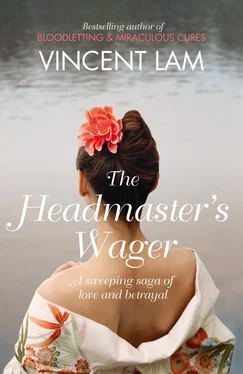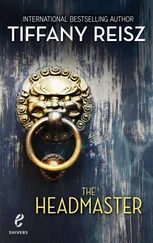Percival rose from his chair. “What were you thinking today at the Teochow school?”
“Are people already talking about our protest?” He stood in the doorway, excited, his white school shirt soaked through with sweat.
“Protest. Is that what you call this stupidity?”
“ Ba ,” he said, his eyes wide. “You said yourself this morning that the Chinese should not be forced to study Vietnamese.”
“Did I raise a fool?”
Dai Jai’s voice fell. “I thought you would be proud.”
“For bringing trouble? I heard of your … theatre from people in Saigon. Do you understand?”
“Good,” he puffed up. “They know that the Chinese will not be pushed around, yes, ba ?”
Percival’s mouth felt numb as he said in a softer voice, “Son, if you wish to do something, it is often best to give the appearance that you have done nothing at all.”
The last of Dai Jai’s proud stance withered. “But I did it to please you,” he said.
“I see.” Percival slumped into his chair, the anger flushed out by guilt and fear. His hand went to his temple. “No matter, your father is well connected. I will fix it.”
That night, Percival and Dai Jai ate together as usual in the second-floor sitting room. The cook made a simple dinner of Cantonese fried rice. As they were eating, there was a knock at the front door. From downstairs came the shuffle of Foong Jie’s feet. Percival could hear the nasal tones of Vietnamese words, a man’s voice, but he could not make out what was being said. Downstairs, the metal gates clanged shut. Foong Jie appeared with a manila envelope. She was alone.
Percival exhaled.
She handed Percival the envelope and slipped out. With sweaty, shaking hands, he ripped it open.
“What is it, ba ?”
Percival waved the letter at Dai Jai. “A note from your mother,” he said. “She has heard about your … incident. She wants me to meet her tomorrow in Saigon.”
The boy picked up his bowl and resumed eating. After a while, Dai Jai broke the silence with laughter, still holding his bowl, almost choking on his food. He swallowed and wiped tears from his eyes. “You thought—” and he was again seized with uneasy laughter. “Well, it was not the police, just a note from Mother.”
“This is nothing to laugh about!” said Percival. He pushed away his half-eaten dinner. He stood and turned on the radio. After a hiss and pop, the Saigon broadcast of Voice of America was recounting the day’s news, informing listeners that the Americans had bombed oil depots in Hanoi and Haiphong, that the French president, De Gaulle, had announced he would visit Cambodia in September, and that Buddhists in Hue and Da Nang were protesting against Prime Minister Ky’s military government.
Percival’s spirits lifted. Were the monks setting themselves alight once again? He had often remarked that he couldn’t understand these bonzes—they killed themselves to criticize the government, but surely the government must be glad that some of their critics were dead. After news of an immolation, Percival was always relieved to see the one-eyed monk in the square, for he was fond of that one, who seemed to have the intensity that a martyr would require. The suicides by fire attracted a great deal of attention, though, so now Percival listened with hope. Surely, those in Saigon who watched for dissent would take more interest in a new spate of Buddhist trouble than in some trivial incident at a Chinese school in Cholon. Percival turned to Dai Jai. “I will meet with your mother tomorrow. Do you see how serious this is?”
“I’m sorry, Father. I thought it would make you proud.”
What to say, that he might have been, if the incident had remained Cholon gossip rather than Saigon trouble? But even if that had been the case, he would have had to instruct the boy nonetheless, that he must learn to pair his best impulses with canny quiet. Percival said, “I will fix this. Until then, you cannot leave Chen Hap Sing.”
“I need to go out tonight. I need—”
“No!”
“ Ba , I have to buy larvae for my fish. They need to eat every day.”
Percival was tempted to ask whether Dai Jai was planning to buy fish food from a pretty Annamese fellow student, but that didn’t seem so important now. “Someone might be outside, waiting to arrest you. I will send one of the servants for your larvae.”
Later that evening, Percival went out on the second-floor balcony where Dai Jai kept his tanks. The boy made no acknowledgement of his father’s appearance, but continued to skim the water clear with a flat net. Yes, for the boy to be so moody about staying in, it must have been a rendezvous with the girl. Ever since he was very small, Dai Jai had nurtured gouramis and goldfish, kissing fish and fighting fish. In recent years Dai Jai had renounced most of his childhood toys and games in favour of soccer with his friends, stolen cigarettes, and a French lingerie catalogue that one of the sweepers had found hidden in his room, and which Percival had directed be placed back exactly where it was found with nothing more to be said about it. The one fascination that persisted from boyhood was the fish.
Percival held out two lotus-leaf cones of live mosquito larvae in water. “For you, Son.” He had gone out himself to buy them, but did not say so. This was the hour that the casinos were becoming busy and filled with people he knew, but Percival had no urge to gamble tonight. He must stay close by, in case something happened.
Dai Jai took the cones with quiet thanks, and gently tore off a corner to let the fluid out. He began to pour the food into each tank. The fish darted amongst the water plants to take their meal. Dai Jai went from one tank to another, feeding the fish until the whole row of tanks was a shimmering display.
“How do you know the song ‘On Songhua River’?” asked Percival. Why would the boy know that old tune of the Chinese resistance against Japan’s occupation? It was not a modern melody.
“You often hum it.”
That was what Percival had thought. “What you did was foolish, but I appreciate the spirit in it.”
Dai Jai put down the net. “Father, you always say that wherever we Chinese go in the world, we must remain Chinese.” The words Percival had spoken many times now rang back in echo. Beneath the sky’s thick gloom, points of light appeared in the square below. The first lamps on the night vendors’ carts were being lit, their flames dancing and spitting briefly until they were trimmed into a steady light. People emerged from their houses, chatted happily and walked with new energy in the cool hour.
“Son, a man can think without acting, or act without being seen. A son should be dutiful. Not reckless.”
“Yes, Father.”
“We are wa kiu .” They were overseas Chinese, those who had wandered far from home. “We are safer when we remain quiet.” The lamps in the square glowed into brightness—one after another. It happened quickly, as if each lamp lit the next. Cholon was most alive, sparkling with energy, in the early evening. Dai Jai’s fish pierced the water’s surface and took the tiny larvae into their mouths, leaving behind rippled circles. “Until I have dealt with the problems you have caused, don’t leave the house anymore. Don’t go to the cinema or the market. Don’t go to the Teochow school. Don’t even attend school here. Be invisible.”
“Yes, Father.”
“If there are visitors from Saigon, hide yourself well, but stay in the house. You are safer here.” The old house had many dark hallways and secret nooks. It was the house that Chen Kai had built. It would be safe.
CHAPTER 3 Contents Cover Title Page Dedication For William Lin Part One Chapter 1 Chapter 2 Chapter 3 Chapter 4 Chapter 5 Chapter 6 Chapter 7 Chapter 8 Part Two Chapter 9 Chapter 10 Chapter 11 Chapter 12 Chapter 13 Chapter 14 Chapter 15 Chapter 16 Chapter 17 Chapter 18 Chapter 19 Part Three Chapter 20 Chapter 21 Chapter 22 Chapter 23 Chapter 24 Part Four Chapter 25 Chapter 26 Chapter 27 Chapter 28 Chapter 29 Chapter 30 Acknowledgements Copyright Конец ознакомительного фрагмента. Текст предоставлен ООО «ЛитРес». Прочитайте эту книгу целиком, купив полную легальную версию на ЛитРес. Безопасно оплатить книгу можно банковской картой Visa, MasterCard, Maestro, со счета мобильного телефона, с платежного терминала, в салоне МТС или Связной, через PayPal, WebMoney, Яндекс.Деньги, QIWI Кошелек, бонусными картами или другим удобным Вам способом. About the Publisher
Читать дальше












